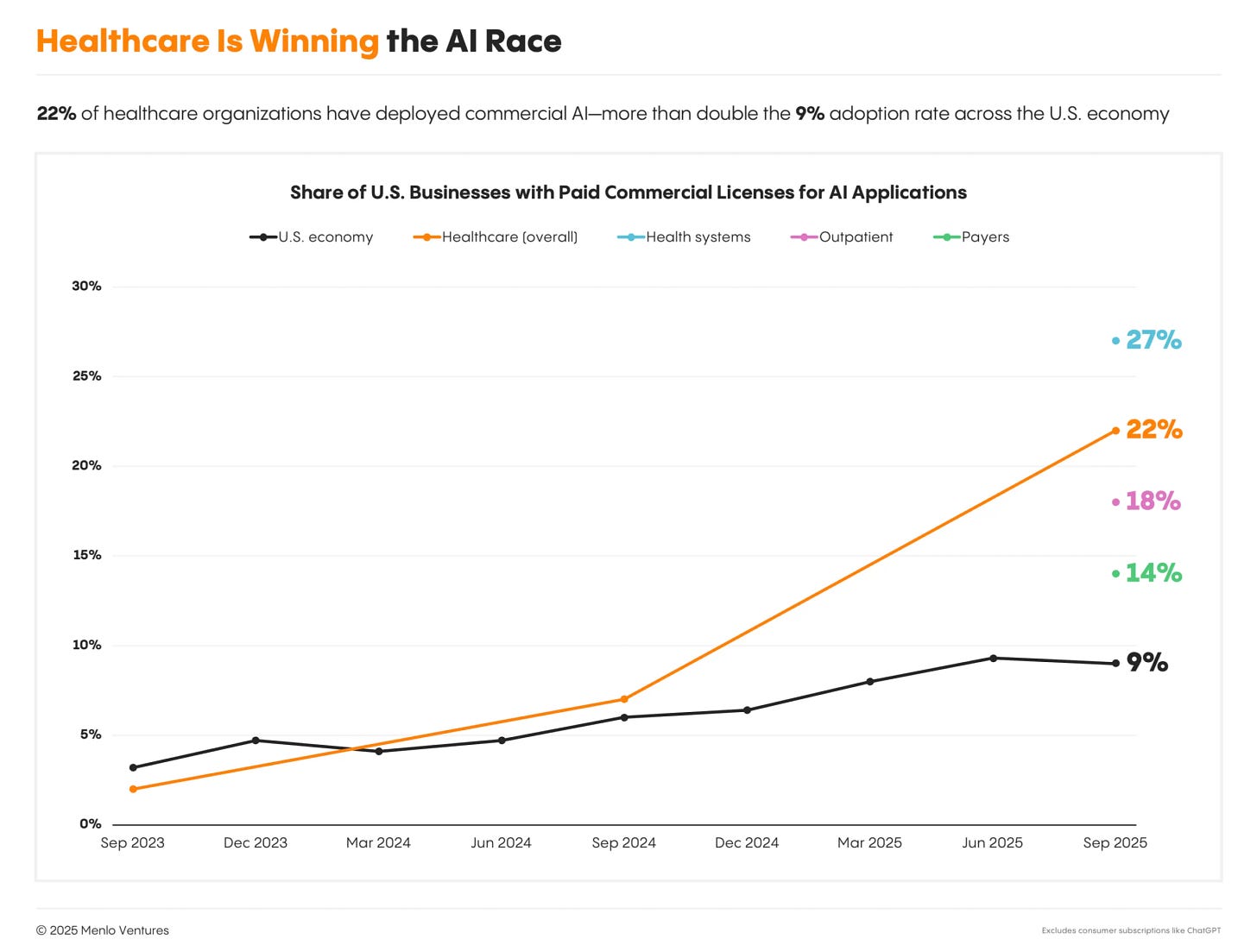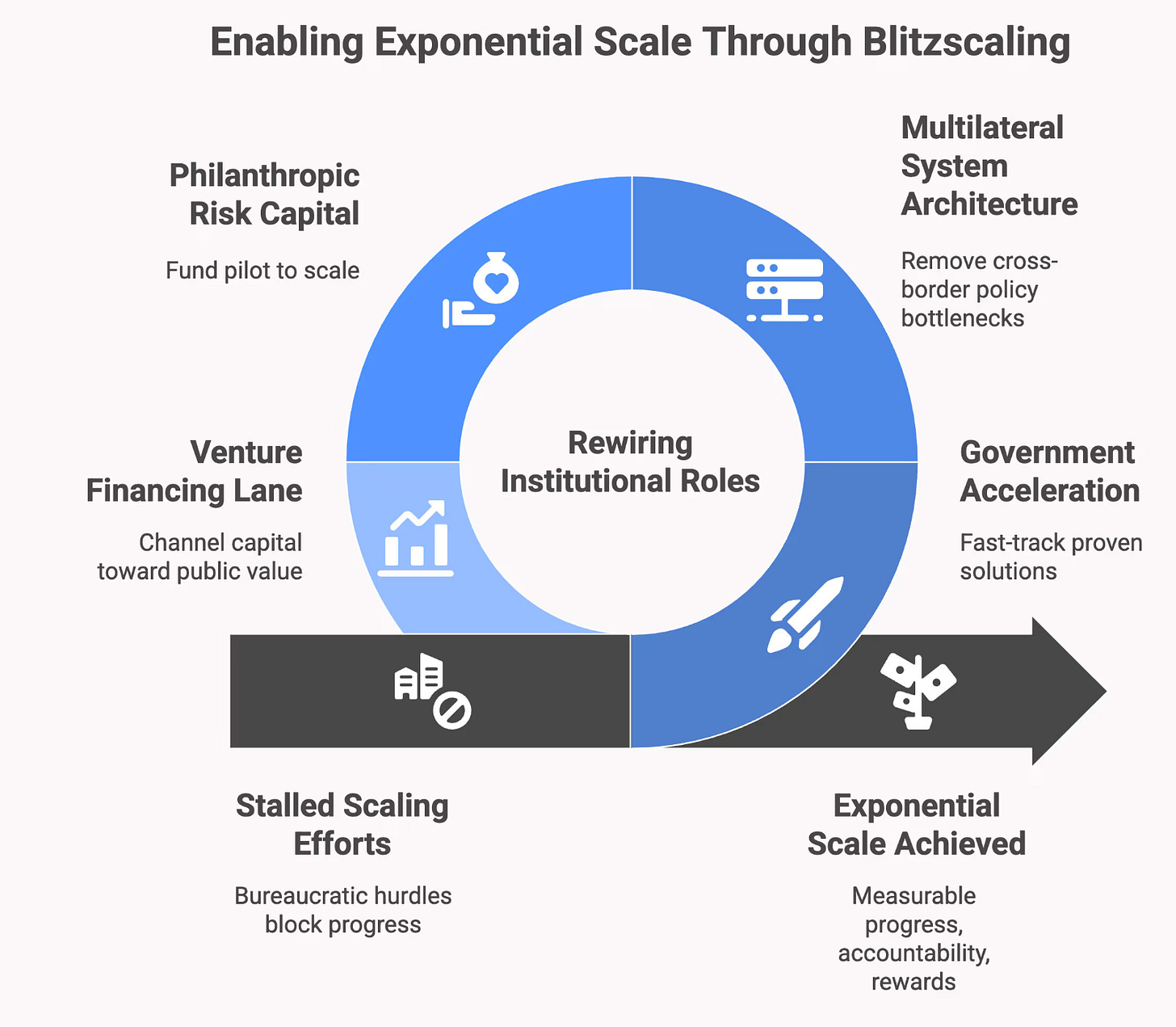Four For Friday | Oct 24, 2025
LF193 | Impact of AI on longevity, healthcare - the AI wunderkind, Vitamin D - the longevity pill, blitzscaling impact + OpenAI Atlas browser.
Welcome to this week’s Four For Friday - nuggets of interesting things I’ve picked up this week, plus my favorite AI tool du jour. Writing this from LAX after a productive ten-day US trip that took in Bay Area and the madness of HLTH in Vegas.
1. What will be the net impact of AI on longevity?
The FT’s data geeks are taking on what AI means for longevity (link here, limited access link for non-subscribers), and it’s a mixed bag.
On the one hand, remarkable longevity breakthroughs are being seen (e.g. with AlphaFold), but it also brings with it the darker side - more losers from transformed industries, potentially increasing middle-aged mortality from joblessness and isolation.
These ‘deaths of despair’ stem not from distress alone but from lasting unemployment and social disconnection, particularly in English-speaking nations. If AI eliminates careers at scale, even universal basic income may not replace work’s social benefits. As Michael Sandel points out in The Tyranny of Merit, humans are designed for production and contribution, not just consumption.
The So What? Expect a life expectancy tug of war between AI-enhanced health for older adults and AI-elevated vulnerability for younger generations.
2. Healthcare becomes an AI-poster child
Sometimes the right idea just takes time - and when it comes to innovation in healthcare, it seems that time is now.
A new report by Menlo Ventures shows how the industry that has been a digital laggard is turning into a leader.
Despite representing 20% of GDP, healthcare only accounts for 12% of percent of software spending, but this is changing. The sector is now deploying AI at more than twice the rate of the broader economy. And as the chart below shows, paid AI licenses across the whole of the U.S. economy plateauing, in healthcare they are on a tear.
Key drivers of this are crushing operational needs around clinician burnout, labor shortages, and eroding margins. Main use cases are ambient clinical documentation and revenue cycle automation (getting more efficient at chasing payers). However, payers worry about surging claims from new AI tools being used by providers.
The So What? Tech has never been the roadblock with implementation, it’s been workflows, adoption and business models. There are signs that this is now changing fast.
3. Vitamin D - an anti-aging pill?
A recent study on Vitamin D suggests we may need to pay more attention to this humble supplement.
A five-year randomized controlled trial with over 1,000 adults found that a daily 2,000 IU supplement of Vitamin D significantly slowed the shortening of telomeres - the protective caps on our DNA that are a key biomarker of cellular aging. Shortened telomeres are linked to a host of age-related diseases. It’s likely Vitamin D’s anti-inflammatory properties are the key to this impact.
The So What? This is probably as much an advert for an anti-inflammatory lifestyle and diet as it is for Vitamin D - but it’s definitely a good idea to get your D levels checked regularly, especially during winter.
4. Blitzscaling for impact
A new piece by the World Economic Forum on “blitzscaling” for impact is trying to use the Silicon Valley playbook to solve the world’s hairy problems.
\The idea is to create “impact unicorns”—organizations measured not by a billion-dollar valuation, but by positively impacting a billion lives. It suggests a system-wide, coordinated approach to co-opt capital deliver this impact:
Instead of relying on fragmented aid and slow-moving FDI, the model proposes “impact clusters” that bring together ventures, governments, multilaterals, and investors to supercharge solutions. Case studies like India’s UPI payment stack and Kenya’s M-Pesa show how this ecosystem approach can compress a decade of market-building into a few years.
The So What? Hopefully this is more than naïve, wishful thinking given dysfunctional governments and the headwinds against corporate impact now. But we’ve got less than 2,000 days to meet the 2030 SDGs - so the article’s call for 1,000 impact unicorns is welcome by my book.
Bonus AI Tip of the Week:
OpenAI launched ChatGPT Atlas - an AI native browser. It lets you open a ChatGPT sidebar in any window to summarize content, compare products, or analyze data. “Agent mode” lets ChatGPT interact with websites on your behalf - e.g. researching and shopping for a trip, finding a recipe and automatically purchasing all the ingredients from Instacart.
The browser was boring, it’s now interesting again. We’re already seeing a massive spike in direct commerce from LLM models, cutting out the browser altogether. This approach is likely to be copied (in fact Microsoft has already released something very similar).
That’s all for now - happy weekend everyone.
- Stephen




